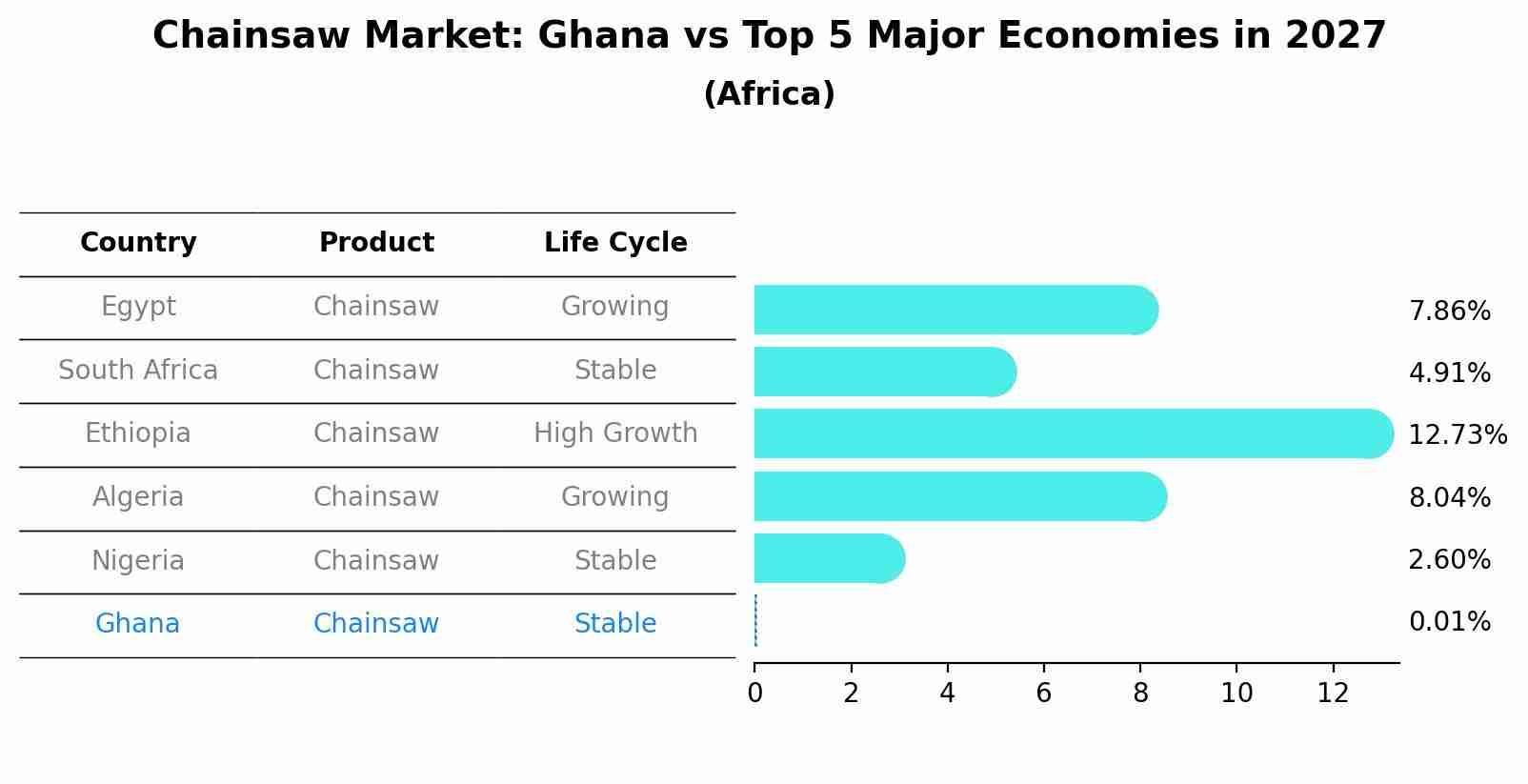Ghana Chainsaw Market (2025-2031) Outlook | Trends, Size, Analysis, Companies, Value, Industry, Forecast, Revenue, Share & Growth
| Product Code: ETC286496 | Publication Date: Aug 2022 | Updated Date: Apr 2025 | Product Type: Market Research Report | |
| Publisher: 6Wresearch | Author: Shubham Padhi | No. of Pages: 75 | No. of Figures: 35 | No. of Tables: 20 |
Ghana Chainsaw Market Size Growth Rate
The Ghana Chainsaw Market is poised for steady growth rate improvements from 2025 to 2029. From 0.01% in 2025, the growth rate steadily ascends to 0.01% in 2029.

Chainsaw Market: Ghana vs Top 5 Major Economies in 2027 (Africa)
The Chainsaw market in Ghana is projected to grow at a stable growth rate of 0.01% by 2027, highlighting the country's increasing focus on advanced technologies within the Africa region, where Egypt holds the dominant position, followed closely by South Africa, Ethiopia, Algeria and Nigeria, shaping overall regional demand.

Ghana Chainsaw Market Overview
In Ghana, the Chainsaw Market is driven by factors such as forestry industry activities, timber harvesting operations, and rural livelihoods. Chainsaws, portable mechanical saws with toothed chains for cutting wood, are widely used by loggers, farmers, and artisans in Ghana for activities such as timber extraction, lumber processing, and woodcraft, contributing to forestry management, economic livelihoods, and wood-based industries.
Drivers of the market
With Ghana significant forestry and agricultural sectors, the demand for chainsaws is driven by the need for efficient woodcutting and land clearing equipment. Forestry management efforts, agricultural practices, and rural development projects are key drivers shaping this market.
Challenges of the market
The chainsaw market in Ghana encounters challenges such as environmental regulations and deforestation concerns limiting logging activities. Moreover, safety concerns and inadequate training for chainsaw operators impact market accessibility and usage in forestry and agriculture sectors.
Government Policy of the market
Government policies in the chainsaw market may focus on forest management, environmental protection, and rural livelihoods. Initiatives might include regulations and incentives to promote sustainable logging practices, chainsaw safety training, and forest conservation measures to mitigate deforestation and biodiversity loss. Additionally, the government may support alternative livelihood programs for communities dependent on chainsaw logging, such as agroforestry, ecotourism, and sustainable forestry management, to reduce reliance on forest exploitation and promote economic diversification. Capacity-building programs for chainsaw operators, forestry officials, and policymakers on sustainable forestry practices, community engagement, and environmental governance may also be promoted to enhance forest stewardship and rural development.
Key Highlights of the Report:
- Ghana Chainsaw Market Outlook
- Market Size of Ghana Chainsaw Market, 2024
- Forecast of Ghana Chainsaw Market, 2031
- Historical Data and Forecast of Ghana Chainsaw Revenues & Volume for the Period 2021-2031
- Ghana Chainsaw Market Trend Evolution
- Ghana Chainsaw Market Drivers and Challenges
- Ghana Chainsaw Price Trends
- Ghana Chainsaw Porter's Five Forces
- Ghana Chainsaw Industry Life Cycle
- Historical Data and Forecast of Ghana Chainsaw Market Revenues & Volume By Product Type for the Period 2021-2031
- Historical Data and Forecast of Ghana Chainsaw Market Revenues & Volume By Gas-Powered for the Period 2021-2031
- Historical Data and Forecast of Ghana Chainsaw Market Revenues & Volume By Electric and Battery Powered for the Period 2021-2031
- Historical Data and Forecast of Ghana Chainsaw Market Revenues & Volume By for the Period 2021-2031
- Historical Data and Forecast of Ghana Chainsaw Market Revenues & Volume By Application for the Period 2021-2031
- Historical Data and Forecast of Ghana Chainsaw Market Revenues & Volume By Residential Construction for the Period 2021-2031
- Historical Data and Forecast of Ghana Chainsaw Market Revenues & Volume By Commercial and Industrial Construction for the Period 2021-2031
- Ghana Chainsaw Import Export Trade Statistics
- Market Opportunity Assessment By Product Type
- Market Opportunity Assessment By Application
- Ghana Chainsaw Top Companies Market Share
- Ghana Chainsaw Competitive Benchmarking By Technical and Operational Parameters
- Ghana Chainsaw Company Profiles
- Ghana Chainsaw Key Strategic Recommendations
Frequently Asked Questions About the Market Study (FAQs):
- Single User License$ 1,995
- Department License$ 2,400
- Site License$ 3,120
- Global License$ 3,795
Search
Thought Leadership and Analyst Meet
Our Clients
Related Reports
- Canada Oil and Gas Market (2026-2032) | Share, Segmentation, Value, Industry, Trends, Forecast, Analysis, Size & Revenue, Growth, Competitive Landscape, Outlook, Companies
- Germany Breakfast Food Market (2026-2032) | Industry, Share, Growth, Size, Companies, Value, Analysis, Revenue, Trends, Forecast & Outlook
- Australia Briquette Market (2025-2031) | Growth, Size, Revenue, Forecast, Analysis, Trends, Value, Share, Industry & Companies
- Vietnam System Integrator Market (2025-2031) | Size, Companies, Analysis, Industry, Value, Forecast, Growth, Trends, Revenue & Share
- ASEAN and Thailand Brain Health Supplements Market (2025-2031) | Strategy, Consumer Insights, Analysis, Investment Trends, Opportunities, Growth, Size, Share, Industry, Revenue, Segments, Value, Segmentation, Supply, Forecast, Restraints, Outlook, Competition, Drivers, Trends, Demand, Pricing Analysis, Competitive, Strategic Insights, Companies, Challenges
- ASEAN Bearings Market (2025-2031) | Strategy, Consumer Insights, Analysis, Investment Trends, Opportunities, Growth, Size, Share, Industry, Revenue, Segments, Value, Segmentation, Supply, Forecast, Restraints, Outlook, Competition, Drivers, Trends, Demand, Pricing Analysis, Competitive, Strategic Insights, Companies, Challenges
- Europe Flooring Market (2025-2031) | Outlook, Share, Industry, Trends, Forecast, Companies, Revenue, Size, Analysis, Growth & Value
- Saudi Arabia Manlift Market (2025-2031) | Outlook, Size, Growth, Trends, Companies, Industry, Revenue, Value, Share, Forecast & Analysis
- Uganda Excavator, Crane, and Wheel Loaders Market (2025-2031) | Strategy, Consumer Insights, Analysis, Investment Trends, Opportunities, Growth, Size, Share, Industry, Revenue, Segments, Value, Segmentation, Supply, Forecast, Restraints, Outlook, Competition, Drivers, Trends, Demand, Pricing Analysis, Competitive, Strategic Insights, Companies, Challenges
- Rwanda Excavator, Crane, and Wheel Loaders Market (2025-2031) | Strategy, Consumer Insights, Analysis, Investment Trends, Opportunities, Growth, Size, Share, Industry, Revenue, Segments, Value, Segmentation, Supply, Forecast, Restraints, Outlook, Competition, Drivers, Trends, Demand, Pricing Analysis, Competitive, Strategic Insights, Companies, Challenges
Industry Events and Analyst Meet
Whitepaper
- Middle East & Africa Commercial Security Market Click here to view more.
- Middle East & Africa Fire Safety Systems & Equipment Market Click here to view more.
- GCC Drone Market Click here to view more.
- Middle East Lighting Fixture Market Click here to view more.
- GCC Physical & Perimeter Security Market Click here to view more.
6WResearch In News
- Doha a strategic location for EV manufacturing hub: IPA Qatar
- Demand for luxury TVs surging in the GCC, says Samsung
- Empowering Growth: The Thriving Journey of Bangladesh’s Cable Industry
- Demand for luxury TVs surging in the GCC, says Samsung
- Video call with a traditional healer? Once unthinkable, it’s now common in South Africa
- Intelligent Buildings To Smooth GCC’s Path To Net Zero


















